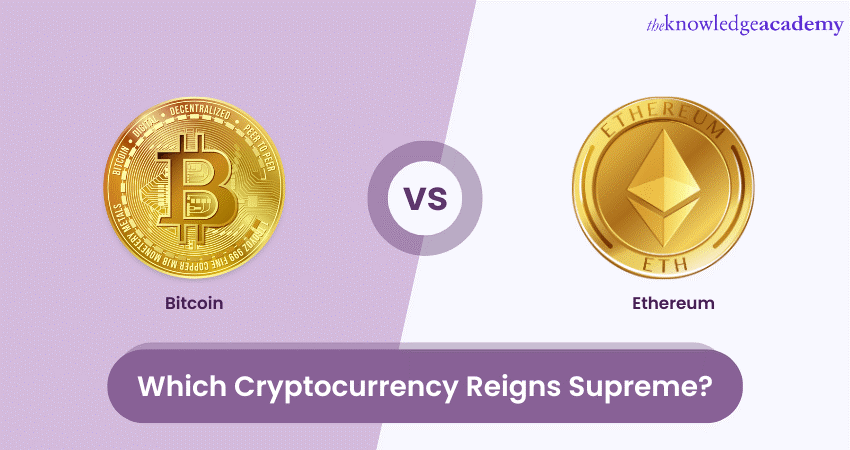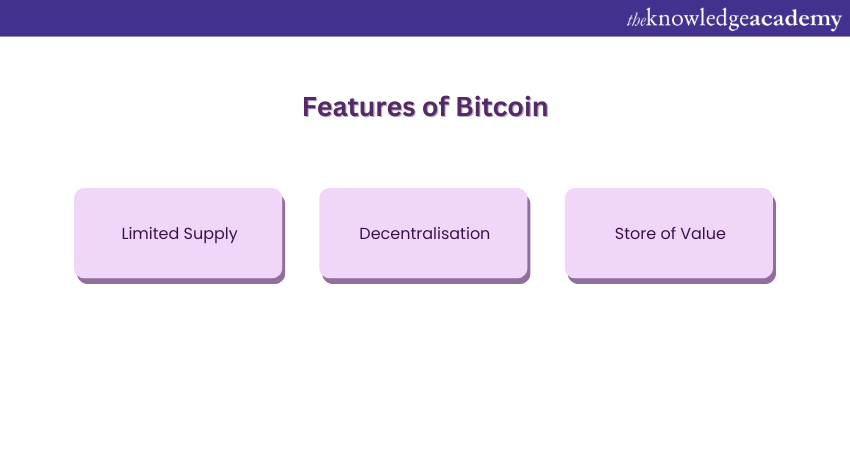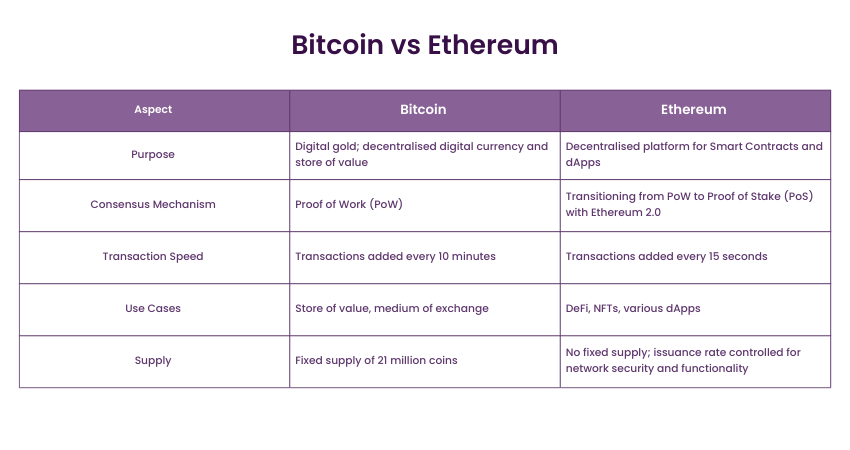We may not have the course you’re looking for. If you enquire or give us a call on +45 89870423 and speak to our training experts, we may still be able to help with your training requirements.
Training Outcomes Within Your Budget!
We ensure quality, budget-alignment, and timely delivery by our expert instructors.

When it comes to Cryptocurrencies, Bitcoin and Ethereum are the two giants everyone talks about. But what makes them different? Bitcoin, often called “digital gold,” is mainly used as a store of value and for secure transactions. Ethereum, however, is a flexible platform that powers Smart Contracts and Decentralised Applications (dApps).
In this blog, we discuss the differences between Bitcoin vs Ethereum and explore why both are essential in the digital finance world.
Table of Contents
1) What is Bitcoin?
2) What is Ethereum?
3) Bitcoin vs Ethereum: Key Differences
4) Bitcoin vs Ethereum: Which one is Better for Long-Term Investment?
5) How to Invest in Bitcoin and Ethereum?
6) Conclusion
What is Bitcoin?
Bitcoin, often called digital gold, is the first and most well-known Cryptocurrency. Created in 2009 by an anonymous person or group known as Satoshi Nakamoto, Bitcoin operates on a decentralised network called Blockchain. This means it isn't controlled by any central authority like a bank or government.
Features of Bitcoin
Here are the features of Bitcoin:

a) Limited Supply: There will only ever be 21 million Bitcoins, making it a deflationary asset.
b) Decentralisation: Transactions are verified by network nodes through cryptography, ensuring security and transparency.
c) Store of Value: Many investors see Bitcoin as a hedge against inflation and economic instability.
What is Ethereum?
Ethereum, launched in 2015 by Vitalik Buterin, is more than just a Cryptocurrency. It's a decentralised platform that enables developers to build and deploy Smart Contracts and Decentralised Applications (dApps). It revolutionises industries beyond finance through its innovative blockchain technology.
Features of Ethereum
Here are the features of Ethereum:
a) Smart Contracts: Ethereum allows you to create and use Smart Contracts, which are self-executing agreements written into code.
b) Decentralised Applications (dApps): You can run Decentralised Applications on Ethereum, which operate without central control.
c) Ether (ETH): Ethereum has its Cryptocurrency called Ether (ETH). It is used to pay for transactions and computational services on the network.
Learn the principles of Blockchain 101 and Ethereum with our Ethereum Developer Training – Join today!
Bitcoin vs Ethereum: Key Differences
Bitcoin and Ethereum are two well-known Cryptocurrencies, but they serve different purposes. Here are some key differences:

Purpose
Bitcoin was created as an electronic currency and as a form of value, such as gold. It is designed to enable people to exchange values as they use money, but without having central control.
On the other hand, Ethereum is much more than just a Cryptocurrency. It is a decentralised platform through which people can write Smart Contracts and also develop decentralised applications. Its native asset, Ether (ETH), facilitates these operations.
Consensus Mechanism
Bitcoin uses a Proof of Work (PoW) consensus mechanism, which requires significant computational power to validate transactions and secure the network.
On the other hand, Ethereum initially used PoW but has been transitioning to Proof of Stake (PoS) with the launch of Ethereum 2.0. PoS is more energy-efficient and involves validators staking their Ether to secure the network.
Transaction Speed
In Bitcoin, transactions are added to the Blockchain approximately every 10 minutes. On the other hand, In Ethereum, transactions are added roughly every 15 seconds, allowing for quicker processing.
Use Cases
Bitcoin is primarily employed as a medium of exchange and a store of value. On the other hand, Ethereum supports one-stop solutions such as Decentralised Finance (DeFi), Non-fungible Tokens (NFTs), and many other Decentralised Applications (dApps).
Supply
Bitcoin has a capped amount of 21 million coins, which contributes to its scarcity and value. On the other hand, Ethereum does not have a fixed supply, but its issuance rate is controlled to maintain network security and functionality.
Bitcoin vs Ethereum: Which one is Better for Long-Term Investment?
Choosing between Bitcoin and Ethereum for long-term investment depends on your investment targets and risk tolerance. Bitcoin is often considered a safer investment due to its established history and store of value narrative, making it popular among investors seeking portfolio diversification and a hedge against economic uncertainty.
On the other hand, Ethereum offers higher potential returns driven by its versatility in applications beyond currency, including Decentralised Finance (DeFi) and Non-fungible Tokens (NFTs).
However, Ethereum's broader use cases also introduce higher volatility and risks compared to Bitcoin. Investors should carefully assess these factors, considering their financial objectives and willingness to navigate market fluctuations.
How to Invest in Bitcoin and Ethereum
Investing in Bitcoin and Ethereum can be done through several methods:
a) Cryptocurrency Exchanges: Platforms like Coinbase, Binance, and Kraken enable you to buy and sell Bitcoin and Ethereum.
b) Wallets: Use secure wallets like hardware wallets (e.g., Ledger Nano S) or software wallets (e.g., Exodus) to store your Cryptocurrencies safely.
c) Dollar-Cost Averaging (DCA): It means buying small amounts of an investment regularly instead of all at once. This helps reduce the risk from market ups and downs.
d) Research and Education: Understand the technology, risks, and market trends before investing.
Learn how Bitcoins work with our Bitcoin and Cryptocurrency Course – Join today!
Conclusion
Both Bitcoin and Ethereum offer unique opportunities for investors interested in Cryptocurrencies. Bitcoin appeals to those seeking stability and a store of value, while Ethereum attracts investors looking to participate in the growing ecosystem of Decentralised Applications and Smart Contracts. Before investing in Bitcoin vs Ethereum, it's crucial to conduct thorough research, assess your risk tolerance, and consider seeking advice from financial professionals.
Learn how to use Solidity to develop Smart Contracts with our Blockchain Training – Join today!
Frequently Asked Questions

There are approximately 19.72 million Bitcoins in circulation. This is about 94% of the total 21 million Bitcoins that will ever exist. For Ethereum, around 120.2 million Ethereum are in circulation.

Some similarities between Bitcoin and Ether are:
a) Both are Cryptocurrencies that can be used for peer-to-peer transactions.
b) Both are based on Blockchain technology and use alphanumeric strings as wallet addresses.
c) Both are open source and have large development communities.
d) Both are decentralised and have a global network of independent nodes.

The Knowledge Academy takes global learning to new heights, offering over 30,000 online courses across 490+ locations in 220 countries. This expansive reach ensures accessibility and convenience for learners worldwide.
Alongside our diverse Online Course Catalogue, encompassing 17 major categories, we go the extra mile by providing a plethora of free educational Online Resources like News updates, Blogs, videos, webinars, and interview questions. Tailoring learning experiences further, professionals can maximise value with customisable Course Bundles of TKA.

The Knowledge Academy’s Knowledge Pass, a prepaid voucher, adds another layer of flexibility, allowing course bookings over a 12-month period. Join us on a journey where education knows no bounds.

The Knowledge Academy offers various Blockchain Training, including Ethereum Developer Training, Blockchain Training and Bitcoin and Cryptocurrency Course. These courses cater to different skill levels, providing comprehensive insights into various Blockchain Developer Skills.
Our Advanced Technology Blogs covers a range of topics related to Blockchain Training, offering valuable resources, best practices, and industry insights. Whether you are a beginner or looking to advance your Blockchain knowledge, The Knowledge Academy's diverse courses and informative blogs have you covered.
Upcoming Business Skills Resources Batches & Dates
Date
 Bitcoin and Cryptocurrency Course
Bitcoin and Cryptocurrency Course
Thu 7th Nov 2024
Thu 27th Feb 2025
Thu 10th Apr 2025
Thu 26th Jun 2025
Thu 28th Aug 2025
Thu 23rd Oct 2025
Thu 4th Dec 2025







 Top Rated Course
Top Rated Course



 If you wish to make any changes to your course, please
If you wish to make any changes to your course, please


